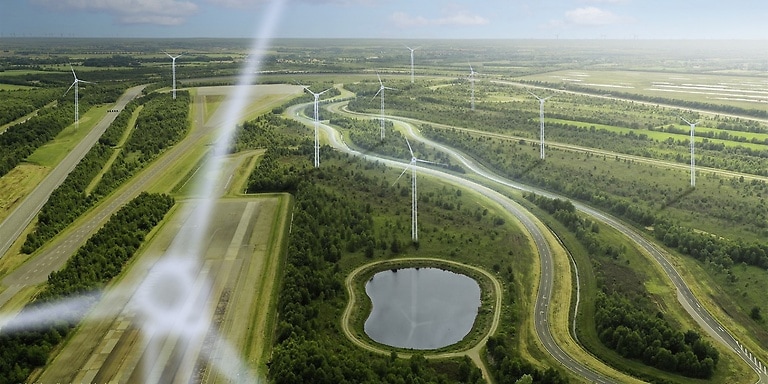Mercedes-Benz AG
Mercedesstraße 120
70372 Stuttgart
Germany
Phone: +49 7 11 17-0
E-Mail: dialog@mercedes-benz.com
Represented by the Board of Management:
Ola Källenius (Chairman), Jörg Burzer, Renata Jungo Brüngger, Sabine Kohleisen, Markus Schäfer, Britta Seeger, Hubertus Troska, Harald Wilhelm
Chairman of the Supervisory Board: Bernd Pischetsrieder
Court of Registry: Stuttgart; commercial register no. 762873
VAT ID: DE 32 12 81 763
All information about our products can be found on your country-specific Mercedes-Benz product page.
September 19, 2022 – Mercedes-Benz plans to build a wind farm at its test track in Papenburg, northern Germany, with an output of more than 100 MW to cover more than 15 percent of the annual electricity demand of Mercedes-Benz Group AG in Germany.
As part of its effort to erect a double-digit number of wind turbines by the middle of the decade, Mercedes-Benz is also planning a long-term power purchase agreement with a partner, equivalent to a triple-digit million euros amount. The large-scale installation of photovoltaic systems on the test site is also under examination. The project plans and an ecological impact review will be carried out in close coordination with the local authorities and stakeholders. The approximately 800-hectare site has been an integral part of the company’s research and development activities since 1998. With this project, Mercedes-Benz is expanding its green electricity portfolio in the medium term and at the same time actively supporting the expansion of onshore wind energy in Germany.
The targeted expansion of renewable energies at our own locations is an integral part of our sustainability strategy. With the realization of the planned wind farm project in Papenburg, we are taking an important step in this direction. We make an active contribution to the energy transition and the expansion of onshore wind power in Germany. By installing photovoltaic systems on the roofs of our plants on a large scale, we are gradually reducing our external energy requirements.
Since this year, production at company plants has been CO₂-neutral and Mercedes-Benz is pursuing the goal of covering more than 70 percent of the energy demand in production with renewable energies by 2030. As announced at its ESG Conference on April 11 of this year, the company is focusing on the expansion of solar and wind energy at its own locations and by concluding further corresponding power purchase agreements. By 2025, Mercedes-Benz will invest a triple-digit million euros amount in expanding the installation of photovoltaic systems.
The company’s goal is to at least halve CO₂ emissions per passenger car over the entire life cycle by the end of this decade compared to 2020. The most important levers for this are the electrification of the vehicle fleet, charging with green electricity, the improvement of battery technology and the comprehensive use of recycled materials and renewable energies in production.
